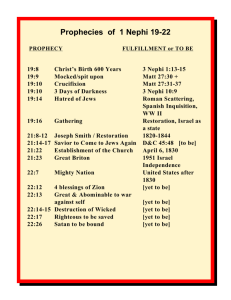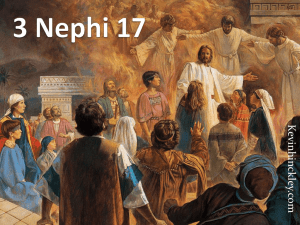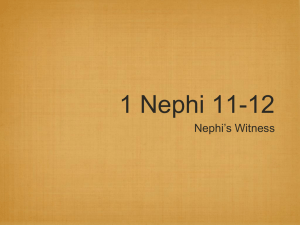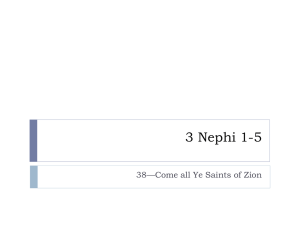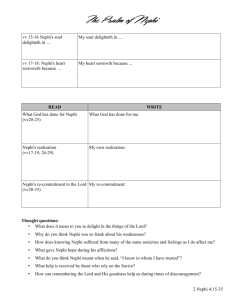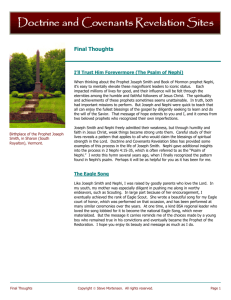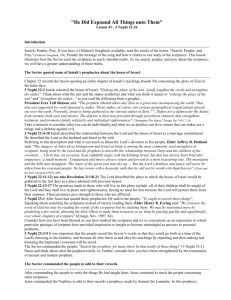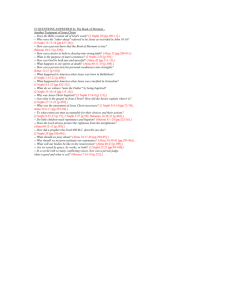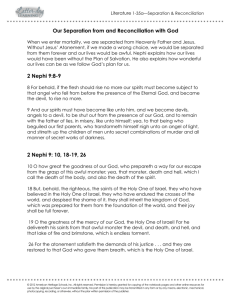Lesson 41 - nathanolsen.com
advertisement
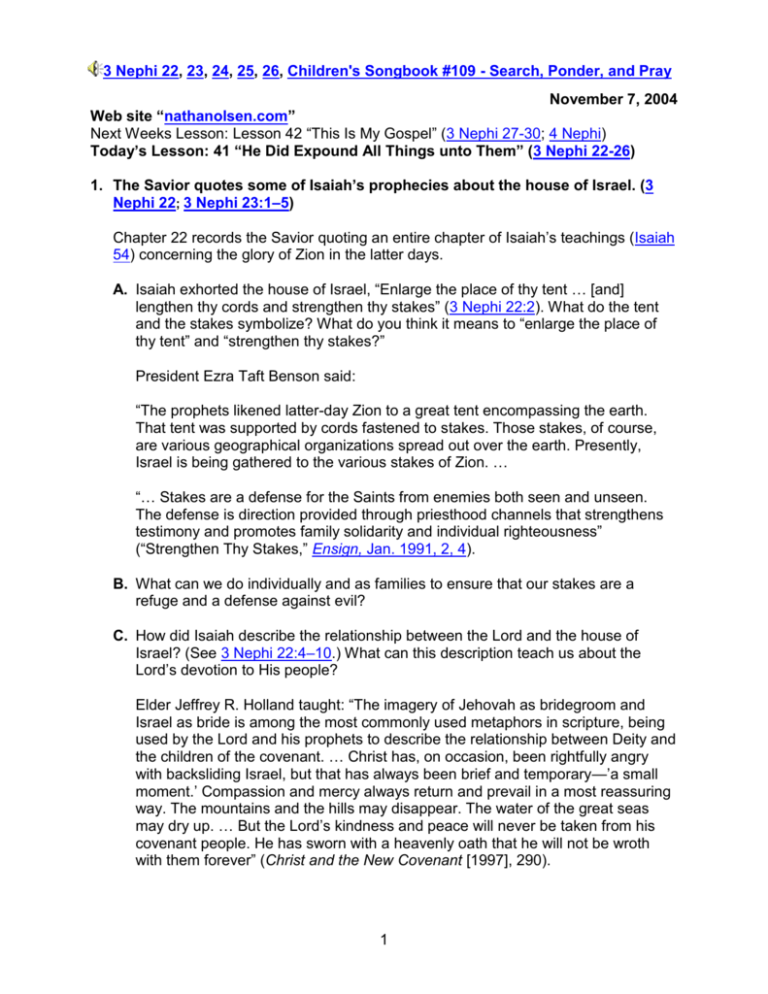
3 Nephi 22, 23, 24, 25, 26, Children's Songbook #109 - Search, Ponder, and Pray November 7, 2004 Web site “nathanolsen.com” Next Weeks Lesson: Lesson 42 “This Is My Gospel” (3 Nephi 27-30; 4 Nephi) Today’s Lesson: 41 “He Did Expound All Things unto Them” (3 Nephi 22-26) 1. The Savior quotes some of Isaiah’s prophecies about the house of Israel. (3 Nephi 22; 3 Nephi 23:1–5) Chapter 22 records the Savior quoting an entire chapter of Isaiah’s teachings (Isaiah 54) concerning the glory of Zion in the latter days. A. Isaiah exhorted the house of Israel, “Enlarge the place of thy tent … [and] lengthen thy cords and strengthen thy stakes” (3 Nephi 22:2). What do the tent and the stakes symbolize? What do you think it means to “enlarge the place of thy tent” and “strengthen thy stakes?” President Ezra Taft Benson said: “The prophets likened latter-day Zion to a great tent encompassing the earth. That tent was supported by cords fastened to stakes. Those stakes, of course, are various geographical organizations spread out over the earth. Presently, Israel is being gathered to the various stakes of Zion. … “… Stakes are a defense for the Saints from enemies both seen and unseen. The defense is direction provided through priesthood channels that strengthens testimony and promotes family solidarity and individual righteousness” (“Strengthen Thy Stakes,” Ensign, Jan. 1991, 2, 4). B. What can we do individually and as families to ensure that our stakes are a refuge and a defense against evil? C. How did Isaiah describe the relationship between the Lord and the house of Israel? (See 3 Nephi 22:4–10.) What can this description teach us about the Lord’s devotion to His people? Elder Jeffrey R. Holland taught: “The imagery of Jehovah as bridegroom and Israel as bride is among the most commonly used metaphors in scripture, being used by the Lord and his prophets to describe the relationship between Deity and the children of the covenant. … Christ has, on occasion, been rightfully angry with backsliding Israel, but that has always been brief and temporary—’a small moment.’ Compassion and mercy always return and prevail in a most reassuring way. The mountains and the hills may disappear. The water of the great seas may dry up. … But the Lord’s kindness and peace will never be taken from his covenant people. He has sworn with a heavenly oath that he will not be wroth with them forever” (Christ and the New Covenant [1997], 290). 1 D. How did the Lord describe the place to which the house of Israel would be gathered in the last days? (See 3 Nephi 22:11–12; see also Revelation 21:18– 21.) What are the promises made to those who will live in this place? (See 3 Nephi 22:13–17.) How can these promises give strength to those who are afflicted? E. After Jesus had quoted these prophecies, He said to the people, “Ye ought to search these things” (3 Nephi 23:1). What does it mean to search the scriptures instead of merely read them? Elder Henry B. Eyring said: “We treasure the word of God not only by reading the words of the scriptures but by studying them. We may be nourished more by pondering a few words, allowing the Holy Ghost to make them treasures to us, than by passing quickly and superficially over whole chapters of scripture” (in Conference Report, Oct. 1997, 115; or Ensign, Nov. 1997, 84). F. How have you been blessed as you have studied the scriptures? G. Why was it important that the people record the Savior’s words? (See 3 Nephi 23:3–5.) H. The Savior commanded the people, “Search the prophets, for many there be that testify of these things” (3 Nephi 23:5). Of what do the prophets testify? How have you been strengthened by the testimonies of ancient and modern prophets? 2. The Savior commands the people to add to their records. (3 Nephi 23:6–14; 3 Nephi 24; 3 Nephi 25) After commanding the people to write the things He had taught them, Jesus continued to teach the people concerning other scriptures. A. Jesus commanded the Nephites to add to their records a prophecy made by Samuel the Lamanite. In this prophecy, Samuel said that “many saints [would] arise from the dead, and [would] appear to many, and [would] minister unto them” (3 Nephi 23:6–13). Why do you think this particular record was important? 2 B. After Jesus told the people to write Samuel’s prophecy, what did He command them to do? (See 3 Nephi 23:14.) In what specific ways can we more effectively teach the words of the Savior? C. Jesus also commanded the people to write some of the words of the prophet Malachi (3 Nephi 24:1). Why were the words of Malachi absent from the Nephites’ records? (See Bible Dictionary, “Malachi,” 728.) D. What teachings of Malachi are of special importance to us? (3 Nephi 24:1, 3 Nephi 24:8–18 and 3 Nephi 25:1–6) (1) 3 Nephi 24:1; compare Malachi 3:1. What is the messenger sent to prepare the way for the Lord’s Second Coming? (See D&C 45:9.) In what manner might Joseph Smith be considered a messenger for the last dispensation? (2) 3 Nephi 24:8–12; compare Malachi 3:8–12. What blessings are promised in these verses to those who pay tithes and offerings? How have you been blessed as you have paid tithes and offerings? (3) 3 Nephi 24:13–18; compare Malachi 3:13–18. Why might some people believe that “it is vain to serve God”? (See 3 Nephi 24:14–15.) How can we remain steadfast in our faith even when evil seems to be prospering? (4) 3 Nephi 25:1–6; compare Malachi 4:1–6. What does it mean to be left without root or branch? Whom did the Lord say He would send before the Second Coming? When and where did Elijah return? (See D&C 110:13–16.) What keys did he restore? 3. The Savior expounds all things from the beginning. (3 Nephi 26) A. What reason did the Savior give for teaching the prophecies of Malachi to the Nephites? (See 3 Nephi 26:2.) Which teachings of Malachi have been of special significance to you? B. What did the Savior teach the people after discussing the prophecies of Malachi? (See 3 Nephi 26:1, 3 Nephi 26:3–5.) Why should we teach the gospel “from the beginning,” as Jesus did? C. In his record, Mormon included only “the lesser part” of what Jesus taught the people (3 Nephi 26:8). How does having only this small part try our faith? How can we receive “the greater things”? (See 3 Nephi 26:9.) President Spencer W. Kimball said: “I have had many people ask me through the years, ‘When do you think we will get the balance of the Book of Mormon records?’ And I have said, ‘How many in the congregation would like to read the sealed portion of the plates?’ And almost always there is a 100-percent 3 response. And then I ask the same congregation, ‘How many of you have read the part that has been opened to us?’ And there are many who have not read the Book of Mormon, the unsealed portion. We are quite often looking for the spectacular, the unobtainable. I have found many people who want to live the higher laws when they do not live the lower laws” (The Teachings of Spencer W. Kimball, ed. Edward L. Kimball [1982], 531–32). D. 3 Nephi 26:14, 3 Nephi 26:16. What do these verses indicate about how the Savior regards children? E. How did the Nephites who had witnessed these events treat each other? (See 3 Nephi 26:19–21.) How can we follow their example in our marriages, families, wards, and stakes? The Savior showed us the importance of the scriptures by quoting them, commanding the people to search them, and adding to them. As we search, ponder, and pray about the scriptures, we will understand them more deeply and be able to teach them to others more effectively. 4
